
Fourth National Transdisciplinary Conference on
CULTURAL INTELLIGENCE
AND GLOBAL LEADERSHIP
NAVIGATING THE
INTERCONNECTED WORLD


Fourth National Transdisciplinary Conference on
CULTURAL INTELLIGENCE AND GLOBAL LEADERSHIP
NAVIGATING THE INTERCONNECTED WORLD

Our Publishing
Partner
Organised by Inspiria Knowledge Campus
An IQAC Initiative
What is Cultural Intelligence (CQ)?
Cultural Intelligence (CQ) is the ability to relate to and work effectively across cultures. It means understanding different perspectives, being aware of your own cultural biases, and adapting your behavior to navigate diverse environments—be it in classrooms, workplaces, or communities.
Simply put, Cultural Intelligence is being smart about culture—and using that insight to connect, collaborate, and lead.
Why Cultural Intelligence Matters Today
The Fourth National Transdisciplinary Conference on Cultural Intelligence and Global Leadership convenes experts from management, liberal arts, technology, and tourism to explore cross-cultural leadership in an interconnected world. Emphasizing collaboration across management, IT, media, design, and hospitality, the conference aims to foster inclusive workplaces and leverage technology for cultural understanding. It offers scholars, professionals, and students practical strategies to enhance global leadership effectiveness.
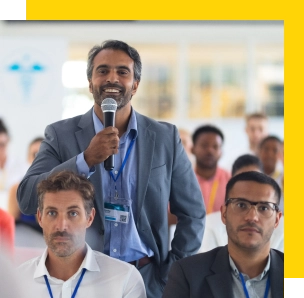
How is Cultural Intelligence related to Global Leadership?
CQ + Global Leadership = Future-Ready Leaders
Leadership today goes beyond authority and expertise; it demands empathy to understand others, flexibility to manage complexity, and communication that builds bridges rather than barriers. Cultural Intelligence equips future leaders with the mindset and skills needed to navigate diverse, multicultural, and rapidly evolving global environments.
Conference Objectives:
- To explore the role of cultural intelligence in leadership across industries and sectors.
- To examine the role of technology and media in promoting cultural understanding and global leadership.
- To foster interdisciplinary collaboration among management, media, design, technology, and hospitality professionals to address global challenges.
- To provide actionable insights for organizations and leaders on creating inclusive, culturally intelligent workplaces.
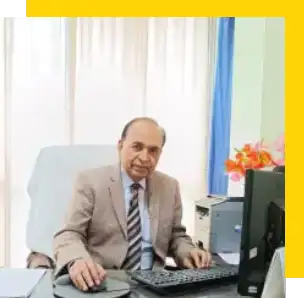
Prof. (Dr.) Hardeo Singh Yadav
Vice Chancellor, Sikkim Professional University
Chief Guest
Prof. (Dr.) Hardeo Singh Yadav is the Vice Chancellor of Sikkim Professional University and the former Director/Vice Chancellor of NERIST, under the Ministry of Education, Government of India. With over 37 years of teaching and research experience and significant administrative roles, he has guided numerous PhD scholars and authored over 60 international journal papers. A chemist by training, Dr. Yadav has been involved in global academic collaborations and has played a pivotal role in shaping technical education in Northeast India.
Prof. (Dr.) Gairik Das
Professor and Head, MBA Programme, IISWBM, Kolkata
Keynote Speaker & Session Chair
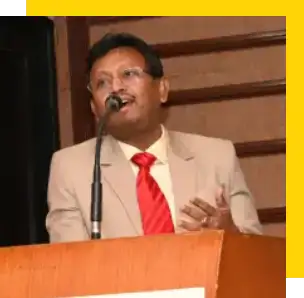

Prof. (Dr.) Milind
Pro Vice Chancellor, Usha Martin University, Ranchi
Guest Speaker & Session Chair
Prof. (Dr.) Subhrajyoti Kundu
Assistant Professor and former HOD of Mass Communication, University of North Bengal
Guest Speaker & Session Chair
Dr. Subhrajyoti Kundu, Assistant Professor and former Head of the Department of Mass Communication at the University of North Bengal, is a distinguished academician and former Director of the Centre for Studies in Local Languages and Cultures. He earned his Ph.D. on the communicational aspects of Rabindrasangeet and was awarded the University Gold Medal by the University of Burdwan, along with the Dasarathi Tah Gold Medal for Rural Communication and the Niranjan Sengupta Smriti Purashkar. A multifaceted personality, Dr. Kundu is also an accomplished visual artist—the only Asian to win First Prize at the International Art Exhibit in Canada—and holds the title of Chitra Bhushan from Pracheen Kala Kendra for excellence in painting.
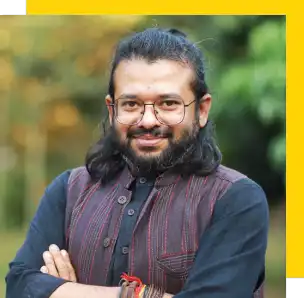

Prof. (Dr.) Mrityunjay Kumar
Mrityunjay Kumar, Associate Professor, BITS Pilani,
Guest Speaker & Session Chair
Mrityunjay Kumar, Associate Professor at BITS Pilani’s Work Integrated Learning Programmes (WILP) and PhD researcher in Computer Science Education at IIIT Hyderabad, has over 25 years of software industry experience, including leadership roles at Microsoft, Zenoti, and SumTotal Systems. His research focuses on how novice engineers comprehend and design complex software systems, emphasizing systems thinking and practical modeling to enhance engineering education. He has published on virtual labs, experiment design, and industry-readiness of CS graduates, and his teaching blends academic rigor with real-world applicability, offering workshops on clarity, research design, and effective use of AI tools in academia.
Dr. Minal Pareek
Dean, School of Media, Sister Nivedita University, Kolkata
Guest Speaker & Session Chair
Dr. Minal Pareek is the Dean of the School of Media, Communication, Fine Arts, Design, and Performing Arts at Sister Nivedita University, Kolkata, and a media professional with over 20 years of experience. She has held key roles at Aajtak, Amity University, and currently serves as a digital media strategist and consultant on multiple UGC projects. A US IVLP fellow and theatre veteran, she has received several national awards including the Femina Women Achievers’ Award 2024. Her dynamic career blends academic leadership, creative practice, and international collaborations in media education.

Call for Papers & Proposals
Conference Themes and Call for Papers
This conference brings together all four schools at Inspiria Knowledge Campus to explore how Cultural Intelligence shapes leadership across disciplines:
- Management & Entrepreneurship
- Cultural Intelligence in Business Leadership
- Global Business Strategies and Markets
- Leadership in Digital Globalization
- Cultural Intelligence in Finance and Marketing
- Leadership in India’s Startup Ecosystem
- Managing Cultural Diversity in Indian Organizations
- Cultural Intelligence in India’s MSME Sector
- Cultural Intelligence in Indian Talent Management
- Media & Design
- Cultural Intelligence in Media Leadership
- AI in Cross-Cultural Communication
- Cultural Intelligence in Regional Media Platforms
- Vernacular Media Leadership Challenges
- Traditional Art Forms in Contemporary Design
- Cultural Intelligence in Multi-language Content
- Design Solutions for Local Communities
- Cultural Adaptation of Global Media in India
“CQ allows managers to become globally competent leaders.”
Leading Diverse Teams with Cultural Foresight
Research shows that managers with high Cultural Intelligence (CQ) exhibit stronger leadership in global and multicultural environments by fostering inclusion and enhancing performance. They excel at navigating cross-cultural negotiations, creating inclusive team cultures, and building trust in international markets.
- Cultural Intelligence in Business Leadership
- Global Business Strategies and Markets
- Leadership in Digital Globalization
- Cultural Intelligence in Finance and Marketing
- Leadership in India’s Startup Ecosystem
- Managing Cultural Diversity in Indian Organizations
- Cultural Intelligence in India’s MSME Sector
- Cultural Intelligence in Indian Talent Management
“Culturally intelligent creatives lead campaigns that resonate worldwide.”
Creating Globally Relevant, Inclusive Content
Designers and media professionals must connect with diverse audiences while avoiding cultural insensitivity and stereotypes. High Cultural Intelligence (CQ) empowers them to create culturally relevant branding, communicate across visual and narrative differences, and innovate through inclusive design.
- Cultural Intelligence in Media Leadership
- AI in Cross-Cultural Communication
- Cultural Intelligence in Regional Media Platforms
- Vernacular Media Leadership Challenges
- Traditional Art Forms in Contemporary Design
- Cultural Intelligence in Multi-language Content
- Design Solutions for Local Communities
- Cultural Adaptation of Global Media in India
“CQ-driven hospitality fosters exceptional global service standards.”
Serving with Sensitivity in a Global Industry
In the hospitality sector, guest experiences are shaped by cultural expectations. High Cultural Intelligence (CQ) enables professionals to personalize services for international guests, manage diverse teams effectively, and enhance guest satisfaction and loyalty.
- Cultural Intelligence in Tourism Leadership
- Cross-Cultural Competence in Tourism Industry
- Cultural Intelligence in Indian Heritage Tourism
- Local Cuisine as Cultural Tourism Driver
- Digital Solutions for Tourist Homestays
- Cross-Cultural Training for Indian Hospitality
- Cultural Festivals as Tourism Catalysts
- Cultural Intelligence in Sustainable Tourism
“Culturally intelligent tech leaders drive inclusive innovation.”
Engineering Technology for a Diverse World
While technology is global, it is not culture-neutral. Developers with high Cultural Intelligence (CQ) build inclusive software and user interfaces, design for cultural accessibility, and collaborate effectively with international teams.
- Cultural Intelligence in IT Leadership
- Cross-Cultural Data Analytics
- Network Security in Global Context
- Global Decision-Making Technologies
- Digital Solutions for India’s Multilingual Computing
- AI Applications in Indian Language Processing
- Digital Inclusion in Indian Context
- Data-Driven Insights for Indian Markets
- Computer Science
- Cultural Intelligence in IT Leadership
- Cross-Cultural Data Analytics
- Network Security in Global Context
- Global Decision-Making Technologies
- Digital Solutions for India’s Multilingual Computing
- AI Applications in Indian Language Processing
- Digital Inclusion in Indian Context
- Data-Driven Insights for Indian Markets
- Hospitality & Tourism
- Cultural Intelligence in Tourism Leadership
- Cross-Cultural Competence in Tourism Industry
- Cultural Intelligence in Indian Heritage Tourism
- Local Cuisine as Cultural Tourism Driver
- Digital Solutions for Tourist Homestays
- Cross-Cultural Training for Indian Hospitality
- Cultural Festivals as Tourism Catalysts
- Cultural Intelligence in Sustainable Tourism
Papers exploring interdisciplinary connections across these themes are particularly encouraged.
- Best Paper Prizes and Awards worth ₹25000
Management & Entrepreneurship
- Cultural Intelligence in Business Leadership
- Global Business Strategies and Markets
- Leadership in Digital Globalization
- Cultural Intelligence in Finance and Marketing
- Leadership in India’s Startup Ecosystem
- Managing Cultural Diversity in Indian Organizations
- Cultural Intelligence in India’s MSME Sector
- Cultural Intelligence in Indian Talent Management
Media & Design
- Cultural Intelligence in Media Leadership
- AI in Cross-Cultural Communication
- Cultural Intelligence in Regional Media Platforms
- Vernacular Media Leadership Challenges
- Traditional Art Forms in Contemporary Design
- Cultural Intelligence in Multi-language Content
- Design Solutions for Local Communities
- Cultural Adaptation of Global Media in India
Computer Science
- Cultural Intelligence in IT Leadership
- Cross-Cultural Data Analytics
- Network Security in Global Context
- Global Decision-Making Technologies
- Digital Solutions for India’s Multilingual Computing
- AI Applications in Indian Language Processing
- Digital Inclusion in Indian Context
- Data-Driven Insights for Indian Markets
Hospitality & Tourism
- Cultural Intelligence in Tourism Leadership
- Cross-Cultural Competence in Tourism Industry
- Cultural Intelligence in Indian Heritage Tourism
- Local Cuisine as Cultural Tourism Driver
- Digital Solutions for Tourist Homestays
- Cross-Cultural Training for Indian Hospitality
- Cultural Festivals as Tourism Catalysts
- Cultural Intelligence in Sustainable Tourism
Papers exploring interdisciplinary connections across these themes are particularly encouraged.
Who Should Attend

Academics & Researchers

Management Professionals

Design & Media Professionals

Tourism & Hospitality Professionals

Technology & Digital Professionals

Industry
Leaders

Consultant &
Trainers

Students & Career Professionals
Important Dates
Full Paper Submission
July 31, 2025
Full Paper Acceptance Notification
Important Dates
Full Paper Submission
July 15, 2025
Submission Guidelines
When formatting your research paper in APA style, adhere to the following:
- Word Limit: 3000-4000 words (including bibliography)
- Font & Spacing:
Times New Roman, 12-point font
Double-spaced text throughout the document - Margins:
1-inch margins on all sides - Title Page:
Title of the paper
Author(s) name(s) and affiliation(s)
Course (if applicable), instructor, and date - Abstract:
Brief summary (150-250 words) with keywords listed below - Headings: Use APA-style heading levels (e.g., Level 1: Centered, Bold, Title Case)
- In-text Citations:
Author-date style (e.g., Smith, 2020)
For direct quotes, include page numbers (e.g., Smith, 2020, p. 15) - References Page:
Separate page titled References
List sources in alphabetical order by the author’s last name
Use hanging indent format - Tables and Figures:
Labeled and numbered
APA-style captions - Appendices (if applicable):
Each on a separate page, labeled as Appendix A, Appendix B, etc.
Full Paper Submission
- Submit your full paper in word format via email to conference@inspiria.edu.in or in the portal: www.inspiria.edu.in/conference.
- The subject line of the email should read: [Your Last Name]_Conference Abstract Submission.
- After acceptance, authors of shortlisted abstracts Papers will be notified to proceed with registration.
Registration Fee
- Faculty/Research Scholars: INR 1500, Students: INR 500
*Fee includes conference kit and lunch
Publication Opportunities
- All shortlisted papers will be published by Notion Press in the form of Conference Proceedings with International ISBN.
- Selected high quality papers will be published in Scopus/ UGC
Submission Guidelines
When formatting your research paper in APA style, adhere to the following:
- Word Limit: 3000-4000 words (including bibliography)
- Font & Spacing:
Times New Roman, 12-point font
Double-spaced text throughout the document - Margins:
1-inch margins on all sides - Title Page:
Title of the paper
Author(s) name(s) and affiliation(s)
Course (if applicable), instructor, and date - Abstract:
Brief summary (150-250 words) with keywords listed below - Headings: Use APA-style heading levels (e.g., Level 1: Centered, Bold, Title Case)
- In-text Citations:
Author-date style (e.g., Smith, 2020)
For direct quotes, include page numbers (e.g., Smith, 2020, p. 15) - References Page:
Separate page titled References
List sources in alphabetical order by the author’s last name
Use hanging indent format - Tables and Figures:
Labeled and numbered
APA-style captions - Appendices (if applicable):
Each on a separate page, labeled as Appendix A, Appendix B, etc.
Organizing Committee

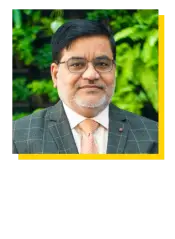





Co-Convenors








Program & Registration Committee














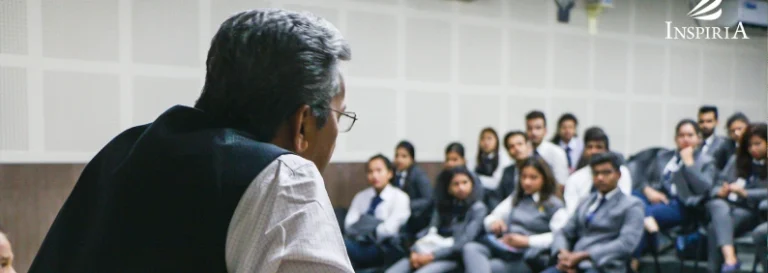
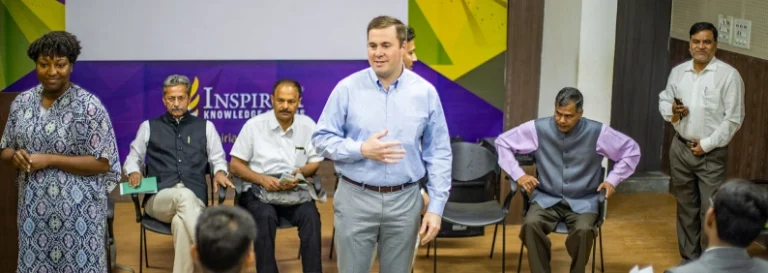
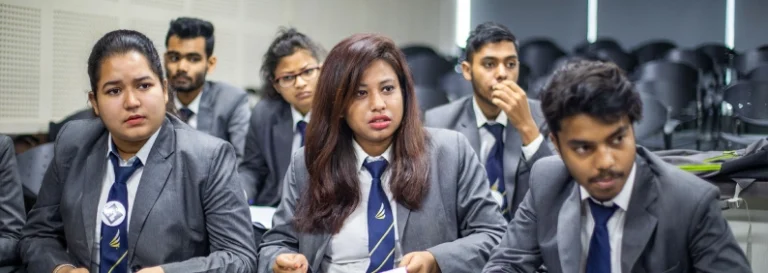
About Inspiria
Inspiria Knowledge Campus, established in 2015, has been a center of academic excellence and practical learning in Siliguri. Affiliated to MAKAUT and AICTE-approved, the college has recently earned NAAC accreditation. Through its four schools – Management, Computer Science, Design and Media, and Hospitality – Inspiria focuses on bridging academic-industry gaps with industry-oriented curriculum.
Located in the serene Himalayan foothills, the campus provides a calm learning environment while maintaining excellent connectivity – 8 km from Bagdogra International Airport and 13 km from New Jalpaiguri Railway Junction. The college emphasizes developing competent, compassionate professionals through transparent governance and modern educational facilities.
Around Siliguri: A Hub of Nature, Culture, and Adventure
- Siliguri, the gateway to Northeast India and the Eastern Himalayas, is surrounded by diverse attractions. The nearby Mahananda Wildlife Sanctuary (13 km) and Jaldapara National Park in the Dooars region showcase rich wildlife including elephants and one-horned rhinoceros. Popular hill stations include Darjeeling (77 km) with its tea gardens and toy train, Kalimpong (65 km) with its colonial charm, and Gangtok (114 km), Sikkim’s vibrant capital known for its Buddhist culture and mountain views.
- The region offers spiritual sites like Sevoke Kali Temple and Salugara Monastery, alongside adventure activities including river rafting on the Teesta. Easily accessible via Bagdogra International Airport (13 km) and New Jalpaiguri Railway Station (7 km), Siliguri serves as an ideal base for exploring the Eastern Himalayas, Sikkim, and Bhutan.
For more info click here
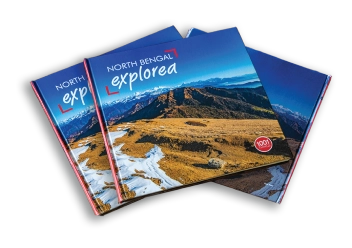
Join Us in Building Global Leaders
This conference invites thought leaders, educators, students, and professionals to engage in meaningful dialogue on:
- The future of global leadership
- The power of cultural intelligence
- How we, across all fields, can lead with empathy and excellence